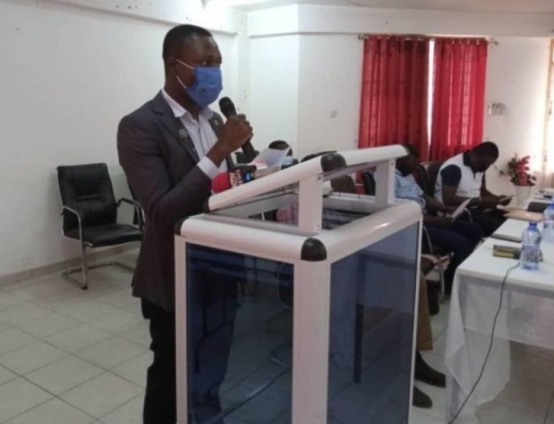The Japan International Cooperation Agency (JICA) has through the “CHPS for Life Project” initiated a two-day training programme on Covid-19 for a total of 1,500 Community Health Officers (CHOs) across five regionsn of the north.
The CHOs are drawn from the various Community-based Health Planning and Services (CHPS) zones across all 55 districts of the Northern, Upper East, Upper West, Savannah and North East Regions.
They are to be taken through various topics including Infection Prevention and Control (IPC), risk communication and social support, screening and triaging, and contact tracing and psychological support among others.
The Wa Municipal Director of Health, Dr Kingsley Pascal Mwin, addressing a press conference in Wa on behalf of the Regional Director of Health Services, Dr Damien Punguyire, stated that Covid-19 was spreading rapidly not only in urban settings but also in rural areas which was a threat to community people.
According to him, the CHOs were responsible for providing interventions such as: surveillance, health education, immunization among others to break the chain of transmission against the spread of Covid-19, adding that the training was, therefore, to enable them work safely and be able to provide useful information about the disease to community members.
“They live in the communities and are expected to build trust in relating to the community members, which predisposes them to community infection of Covid-19”, the Municipal Director of Health added.
On the “CHPS for Life Project”, Dr. Mwin explained that it was the third phase of a technical cooperation project between Ghana and Japan through the Ghana Health Service (GHS) and JICA.
He said the first and second phases were implemented between 2006 and 2016 respectively, adding that whilst the first phase focused on scaling up CHPS, the second phase targeted the improvement of maternal and neonatal health care services in the Upper West Region.
He pointed out that the current phase was using “life course approach”, an approach to access health for all age cohorts by promoting healthy lifestyles and early detection of non-communicable diseases, by building capacity of health workers such as CHOs and other health workers to implement the initiative.
Dr Mwin said the project spanned from June 2017 to June 2022 and the goal was to promote Universal Health Coverage (UHC) by improving access and utilization of primary health care through CHPS.
The main purpose, he said, was to ensure that CHPS services focusing on the life-course approach, were strengthened in the five regions of the north.
Latest Stories
-
EPA says lead-based paints are dangerous to health, calls for safer alternatives
36 minutes -
Queenmother calls on President-elect Mahama to appoint more women in his government
3 hours -
Atletico Madrid beat Barcelona to go top of La Liga
3 hours -
Usyk breaks Fury’s heart with points win in rematch
3 hours -
Ghana-Russia Centre to run Russian language courses in Ghana
8 hours -
The Hidden Costs of Hunger: How food insecurity undermines mental and physical health in the U.S.
9 hours -
18plus4NDC marks 3rd anniversary with victory celebration in Accra
12 hours -
CREMA workshop highlights collaborative efforts to sustain Akata Lagoon
12 hours -
2024/25 Ghana League: Heart of Lions remain top with win over Basake Holy Stars
13 hours -
Black Queens: Nora Hauptle shares cryptic WAFCON preparation message amid future uncertainty
13 hours -
Re-declaration of parliamentary results affront to our democracy – Joyce Bawah
13 hours -
GPL 2024/25: Vision FC score late to deny Young Apostles third home win
14 hours -
Enhancing community initiatives for coastal resilience: Insights from Keta Lagoon Complex Ramsar Site Workshop
14 hours -
Family Health University College earns a Presidential Charter
14 hours -
GPL 2024/25: Bibiani GoldStars beat Nsoatreman to keep title race alive
14 hours

